Picture this: You’re a couple in Bucharest, staring down the barrel of infertility, scrolling through forums late at night, hoping surrogacy might bridge the gap to the family you’ve always envisioned. Romania feels like a natural starting point—affordable clinics, EU perks, and a familiar culture. But as you dive into surrogacy in Romania, the excitement fades fast. Is surrogacy legal in Romania? Short answer: No, it’s effectively banned, trapped in a legal limbo that’s more trap than opportunity. Drawing from the latest insights as of September 2025, this piece cuts through the confusion on surrogacy in Romania and spotlights why Iran emerges as a beacon of reliability for Romanian families chasing that dream.
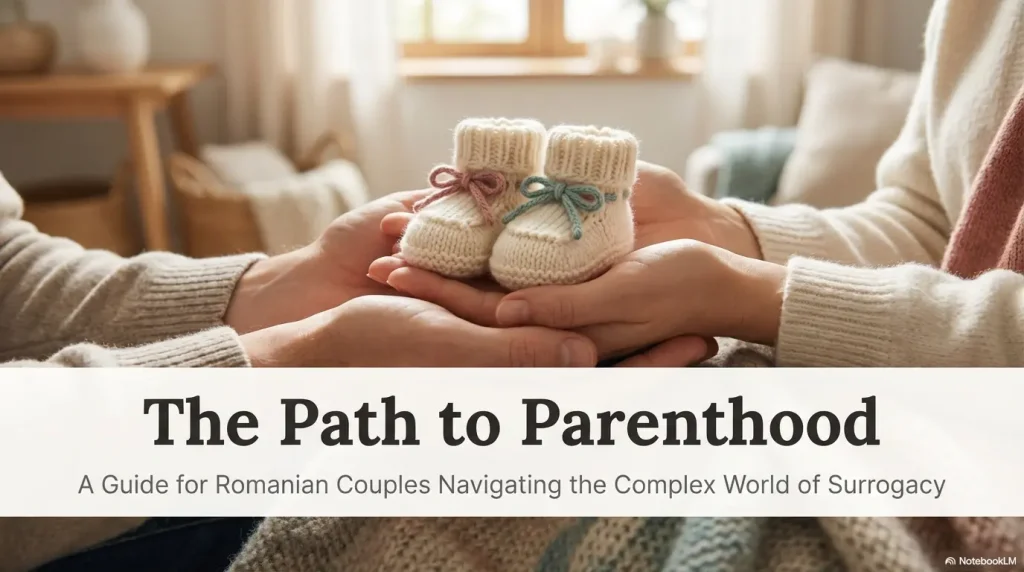
Is Surrogacy Legal in Romania?
Is Surrogacy Legal in Romania?
Is surrogacy legal in Romania? It’s a question that trips up many, and the answer is a firm no—at least in any meaningful, protected way. Romania doesn’t outright criminalize surrogacy, but it’s classified as banned for all under EU overviews and national stances. No dedicated laws exist to govern it, leaving arrangements in a precarious gray zone where courts won’t recognize surrogacy contracts. This means no enforceable parental rights for intended parents, and the surrogate could legally claim the child at birth.
For locals, it’s a non-starter: Romanian family law ties parenthood strictly to biology or adoption, sidelining surrogacy entirely. Single men? Forget it—it’s a criminal offense to pursue surrogacy abroad and try adopting back home. Even married heterosexual couples with infertility diagnoses hit walls; clinics might whisper about underground options, but without legal backing, you’re rolling the dice on everything from embryo transfers to exit visas.
Foreigners fare no better. While Romania’s IVF scene is robust (costs for basic cycles around €3,000-€3,500), surrogacy veers into taboo territory. EU rules defer to national policies, and Romania’s silence speaks volumes: no residency waivers, no international pacts easing the process. Recent 2025 reports echo this—surrogacy isn’t on the table here, unlike neighbors like Ukraine or Georgia.
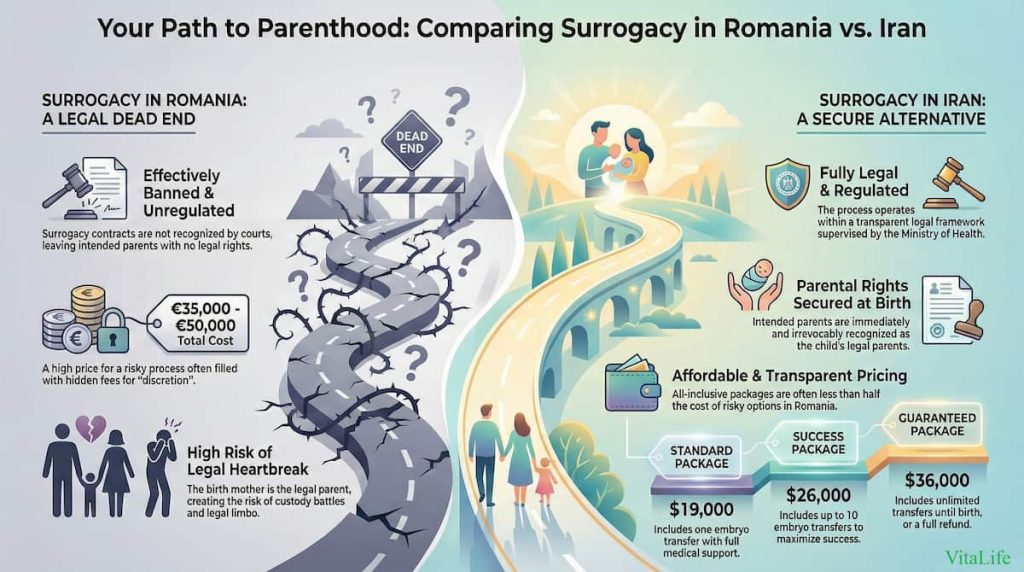
The Realities of Surrogacy in Romania
If you ignore the bans and chase surrogacy in Romania anyway, what does it look like? Clinics in Bucharest or Cluj-Napoca offer gestational surrogacy through back channels, matching intended parents with local women (typically 21-35 years old, vetted informally for health). The timeline? 12-18 months, starting with IVF (success rates around 50-60%), embryo transfer, and prenatal care.
Compensation floats at €15,000-€20,000 for the surrogate, pushing total surrogacy cost romania to €35,000-€50,000—cheaper than Western Europe but laced with hidden fees for “discretion.”
Sounds doable? Not quite. Without regulation, medical standards vary wildly; one clinic’s gold standard is another’s shortcut. Post-birth, registering the child in your name? Good luck—Romanian authorities default to the birth mother as legal parent, sparking custody fights that drag on for years. We’ve heard horror stories from 2025: couples stuck in limbo, newborns in foster care, or shelling out extra for rushed adoptions. For foreigners, exit hurdles compound the chaos—passports denied, embassies dragging feet.
Bottom line: Surrogacy in Romania dangles affordability but delivers heartbreak. It’s unregulated chaos masquerading as opportunity, pushing savvy families to scout beyond borders.
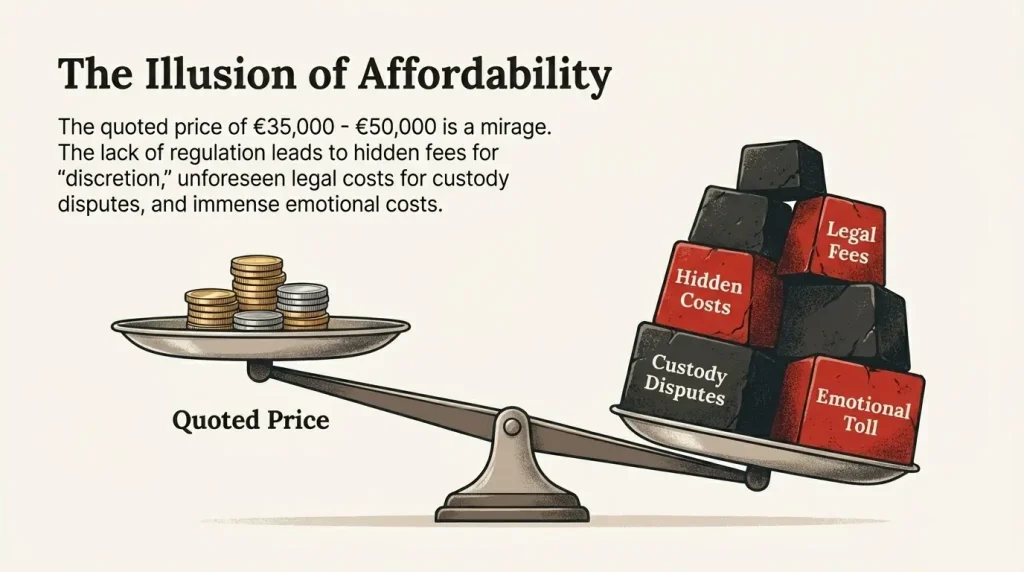
Romania Surrogacy Law: Banned, Not Just Bureaucratic
Peeling back Romania surrogacy law reveals a patchwork of prohibitions. The Civil Code and Family Code ignore surrogacy, treating it as morally fraught and unenforceable. No provisions for commercial or altruistic setups; it’s lumped with bans in Slovakia and Slovenia. Ethical debates rage—some push for regulation to curb exploitation, but as of 2025, lawmakers prioritize adoption reforms over surrogacy bills.
For singles or same-sex couples? Double whammy—outlawed outright. Even for eligible heterosexual marrieds, the law’s filiation rules (maternal link via birth) doom surrogacy claims. Courts have ruled against genetic parents in landmark cases, affirming the surrogate’s primacy. Internationals? EU freedom of movement doesn’t extend here; pursuing surrogacy abroad risks Romanian citizenship denials for the child.
In this vacuum, “agencies” operate in shadows, but experts warn: It’s not worth the gamble. Romania’s surrogacy stance? Banned for good reason—protecting kids from legal tug-of-war.
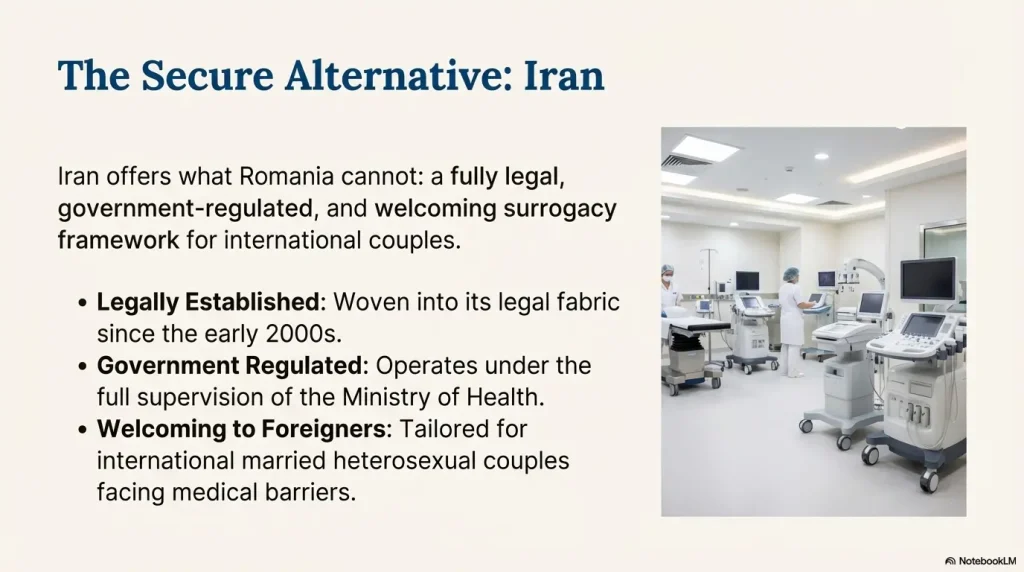
Why Romanian Couples Should Look to Iran?
When surrogacy in Romania hits a dead end, it’s natural to cast a wider net across international options—places like Georgia or Ukraine, which offer regulated programs with established clinics, or even surrogacy in India, once a go-to for its low costs and high volume. But heads up: India’s Surrogacy (Regulation) Act 2021 has shut the door on foreigners, limiting it to altruistic arrangements for Indian couples only, leaving outsiders out in the cold. That’s where Iran steps in as the plot twist you didn’t see coming. A quick hop from Bucharest (under four hours), this Middle Eastern gem has surrogacy woven into its legal fabric since the early 2000s, blessed by Shia jurisprudence as a humane infertility fix. Is surrogacy legal in Iran? Absolutely—fully regulated, welcoming to foreigners, and tailored for couples like you facing medical barriers.
Iran’s framework shines for its balance: Commercial surrogacy (with fair compensation) alongside altruistic options, all for heterosexual married couples aged 20-50 (women) and up to 60 (men), backed by infertility proof. No local egg donors for non-Iranians per citizenship rules, but that’s a minor tweak—bring your own or source ethically.
Here’s the nuts and bolts that make it airtight:
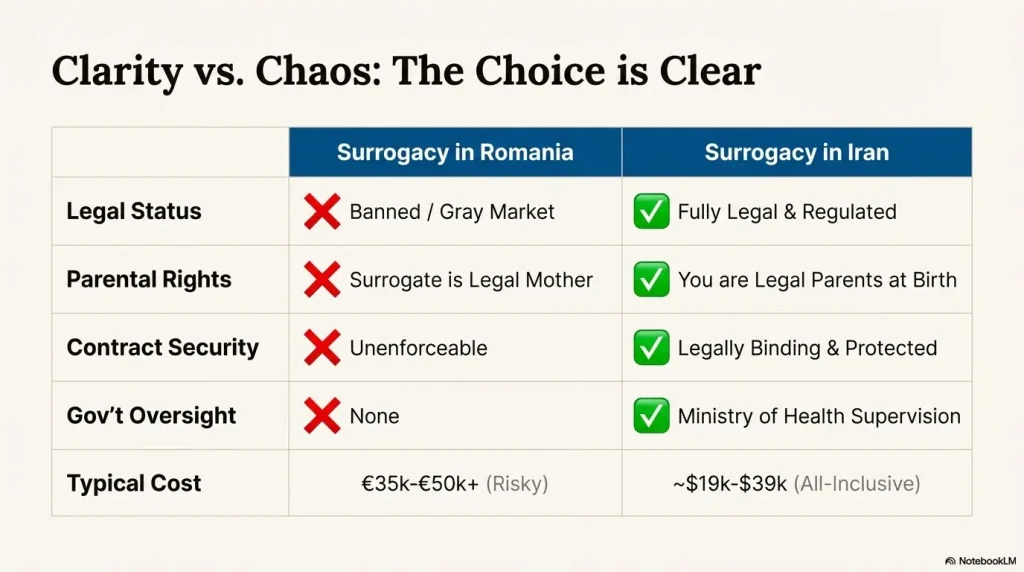
For Intended Parents:
- Eligibility Check: Doctor’s infertility certification, clean records, and a notarized tripartite contract (you, surrogate, clinic). Romanians need apostilled marriage docs and an embassy nod from Tehran for seamless passport issuance.
- Parental Perks: You’re legally the parents at birth—no surrogate veto. Child registered in your name on-site; exit cleared in a week.
For Surrogates:
- Screening: Iranian women 18-40 (prime 20-35), with one healthy kid, spousal okay, and psych evals. No more than two prior C-sections; full STI/genetic checks.
- Safeguards: Contracts cap pay at $8,000-$12,000, cover living costs, and mandate Ministry of Health oversight. Ethical boards greenlight every case, ensuring no coercion.
Process-wise: IVF in top Tehran or Isfahan spots (65%+ success), 9-month monitored pregnancy, total 12-26 months. At $14,000-$16,000 all-in, it’s Europe’s bargain-basement steal—especially when surrogacy cost romania can hit €35,000-€50,000—IVF, surrogate support, legals included. Hood Services, our go-to for internationals, streamlines it all: visas, cultural bridges, and that warm handoff at the airport.
Romanian families love it—the shared respect for family values, English-fluent docs, and zero drama. One Bucharest duo told us: “Iran turned our Romanian roadblock into a straight shot to sleepless nights of joy.”
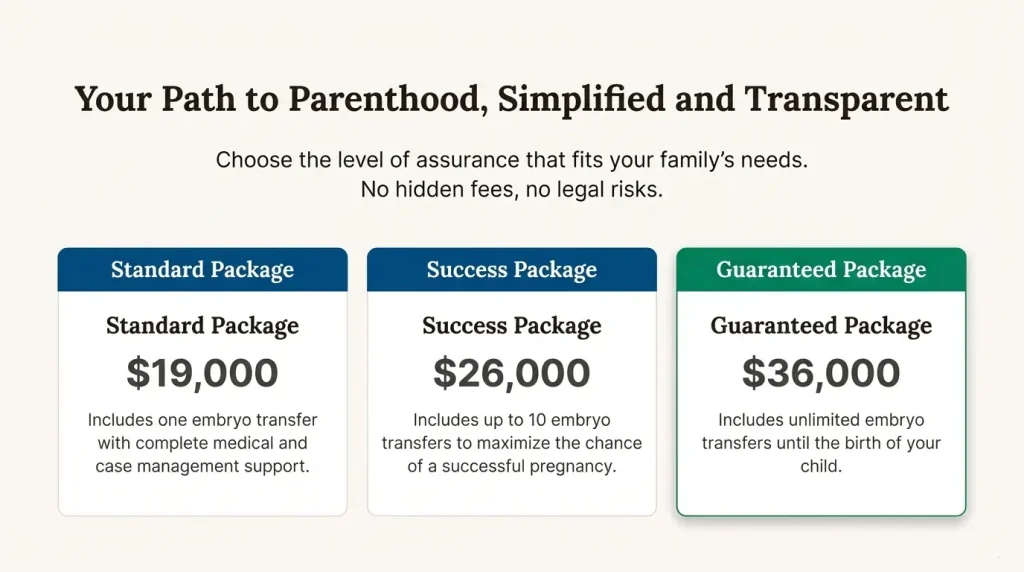
If Surrogacy in Romania Isn't an Option, What's the Secure Alternative?
Given that surrogacy in Romania is illegal and carries significant legal and emotional risks, many Romanian intended parents are seeking a legal, secure, and affordable pathway in another country. This is where Surrogacy in Iran emerges as a leading and reliable choice.
Iran is one of the few countries worldwide where surrogacy operates within a transparent legal framework under the full supervision of the Ministry of Health. The process is entirely legal for international intended parents, including Romanian couples, with parental rights securely and irrevocably established from the moment of birth.
At VitaLife, we specialize in providing Surrogacy in Iran. You can access this service in Iran at a highly affordable cost, benefiting from high medical standards and comprehensive, end-to-end support.
At VitaLife, we specialize in providing Surrogacy in Iran. You can access this service in Iran at a highly affordable cost, benefiting from high medical standards and comprehensive, end-to-end support.
VitaLife’s Transparent, All-Inclusive Iran Surrogacy Packages:
- Standard Package – $19,000: Includes one embryo transfer with complete medical and case management support.
- Success Package – $26,000: Includes up to 10 embryo transfers to maximize the chance of a successful pregnancy.
- Guaranteed Package – $36,000: Includes unlimited embryo transfers until the birth of your child.

Each package encompasses the full legal process, matching with a healthy surrogate, medical care in advanced clinics, and dedicated support from the initial steps to your return to Romania with your child. The stated cost is often less than half the price of risky, unregulated arrangements suggested in Romania’s grey market.
So, if your search for “surrogacy in Romania” has led to a legal dead end, Surrogacy in Iran can be your secure, transparent, and accessible solution to achieving the dream of parenthood.
Final Thoughts
Surrogacy in Romania and its stark is surrogacy legal in Romania? verdict might clip your wings, but Iran’s open skies await. With ironclad laws, ethical heart, and costs that won’t bankrupt you—far below surrogacy cost romania— it’s the pivot point for Romanian parents ready to soar. Why linger in bans when breakthroughs beckon? Connect with Hood Services—let’s script your happy ending, one heartbeat at a time.
